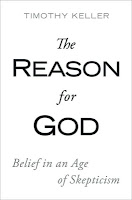Reason for God, VI
 The fifth objection posed by skeptics that Keller addresses is one that has always been difficult to handle: "The Church is responsible for so much injustice."
The fifth objection posed by skeptics that Keller addresses is one that has always been difficult to handle: "The Church is responsible for so much injustice."Keller responds from three different angles: individual character weakness, the history of war and violence and finally, fundamental fanaticism.
Character weakness
It may feel like a straw man response, but the reality is that Christians are not perfect. We are saved by sheer grace, not by our good works. The Church necessarily attracts and is filled with broken people. After coming to faith in Christ, one does not immediately become a Mother Theresa. That said, there are many who have worn the name of Christ, but have not lived it or have likely never been indwelt by his Spirit.
Religion and Violence
Christopher Hitchens rightly argues that many religions often "transcendentalize" ordinary cultural differences so that opposite parties feel they are in a cosmic battle between good and evil. Historically, violence has resulted in different forms. But again, even as a corporate character weakness, the proclivity toward violence in the history of Christianity is not an aberration among all human society. Countless regimes have carried out untold violence due to their own "trancendentalization" of some other concept.
Fanaticism
We've all seen people waving signs that say "God hates &*#$%" or passing out literature condemning to hell everyone wearing improper clothing. These actions by a small proportion of misled, overzealous individuals who appear "over-committed" to their faith have caused many to wave off Christianity altogether. The problem, Keller says, is that these "fanatics" are not so because they are over-committed to Christ's gospel, but because they aren't committed enough. Yeah, that's right. The good news of Christ is one that is based entirely on grace. So, these "fanatics" are not fanatics of Christ's humility, grace, mercy, love and acceptance.
Keller separately addresses the slave trade which many have chalked up as one of the greatest blots on "Christian" history. But, Keller points out that in Britain and in the New World (and similarly in apartheid South Africa), the loudest voices against the slave trade were in fact Christian activists.
After posting five of the seven objections thus far that Keller addresses, I am wondering, what are some that you have asked or faced?

Comments